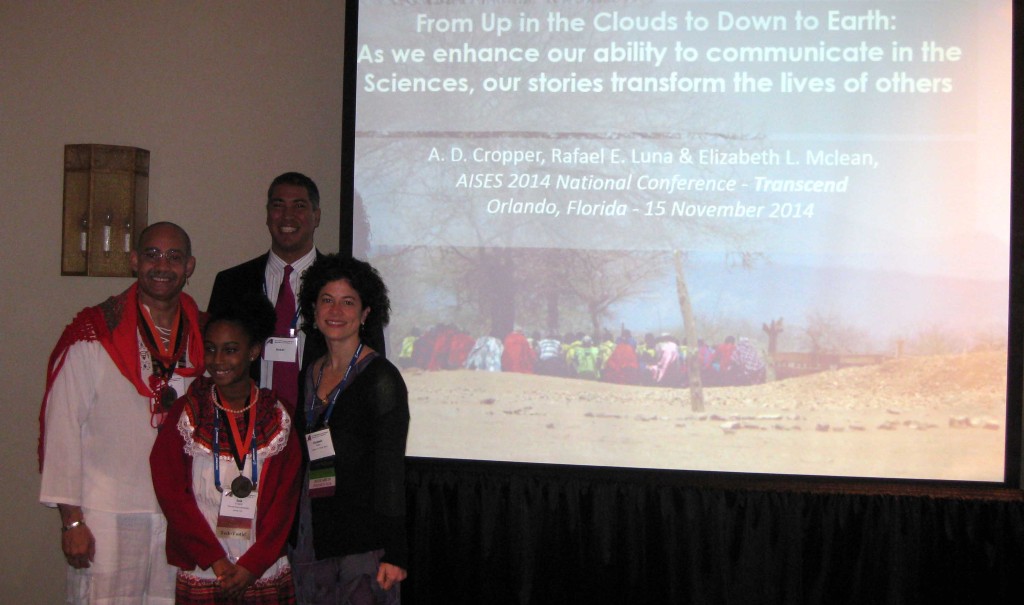#374) Another Happy Scientist/Improv Student
November 20th, 2014
Elizabeth Mclean, Ph.D. student at University of Rhode Island in Natural Resource Sciences wanted to improve her teaching and communications skills. She’s 6 weeks into her improv class. It’s working and she’s having huge fun. If you want to do something truly transformative with your life, I beg you to take an improv class.
 IMPROV IN ACTION. Elizabeth Mclean (right) after her presentation at the American Indian Science and Engineering Society meeting with her co-presenters Dr. A.D. Cropper (left), his daughter, and Dr. Rafael E. Luna, author of The Art of Scientific Storytelling. Her new improv training played a central role in her relaxed delivery and successful presentation.
IMPROV IN ACTION. Elizabeth Mclean (right) after her presentation at the American Indian Science and Engineering Society meeting with her co-presenters Dr. A.D. Cropper (left), his daughter, and Dr. Rafael E. Luna, author of The Art of Scientific Storytelling. Her new improv training played a central role in her relaxed delivery and successful presentation.
THE GOOD NEWS: NO ONE HAS EVER DIED TAKING THEIR FIRST IMPROV CLASS
Guess where Elizabeth Mclean is every Sunday evening. Here’s a hint — it doesn’t involve any Natural Resource Science, and in fact works best if she mostly shuts her brain down and just lives “in the moment,” with little critical thought.
Yes, just like British molecular biologist Dr. Vicky Miller who contacted me last year, she has taken a walk on the social wild side and is enrolled in an improv acting class. And just like Dr. Miller, she loves it. She had to show some initiative to track down a class — eventually asking a fellow scientist who guided her to an improv class offered in Wakefield, Rhode Island.
She was nervous her first night, as every non-actor is nervous when they enter their first night of an acting class. But unlike my experience in the Meisner acting class that opened my first book, where the instructor ripped my head off in front of a class full of laughing hyenas, she encountered incredibly friendly people — both instructor and students — who did something she wasn’t accustomed to in her daily life — they “acknowledged” her. They looked into her eyes, acknowledging the look that was passed on within a trusting circle, and “wow” “how powerful and simple it was, to be acknowledged and to acknowledge others whom she had just met”. That sort of experience is rare in most people’s daily lives where everyone is more into themselves and just doing what they’re doing.
IT’S ABOUT “COMMUNICATING AT A DIFFERENT LEVEL”
After six weeks she’s finding herself overcoming at least a little bit of her shyness and introversion. And this is important because some of the work she is doing in her scientific research involves working with fishermen she doesn’t know. That’s a social process. Improv strengthens social interactions. Bottom line, she’s getting exactly the right training for what she does.
“For me it’s about communicating at a different level,” Elizabeth says. That’s what it’s all about. And she said the other day, when she was teaching an introductory biology lab and was talking about physiology models, and asked the class, “What makes for a really good model?” and the student replied, “Dashing handsome looks”.”
She felt the improv training kick in. Instead of having a first impulse of negation and wanting to say, “No, that’s not what I’m talking about,” she found herself going in the opposite direction, at least just for a moment, affirming the comment with a good old fashioned improv, “Yes, and … what if that handsome fashion model were into a physiology model system, then what…?”
Improv can be life changing in the best way possible. I encourage you to look into it, and if you join a class, definitely get in touch with me as Elizabeth, Vicky Miller and others have. We’re all interested in your experience with improv.